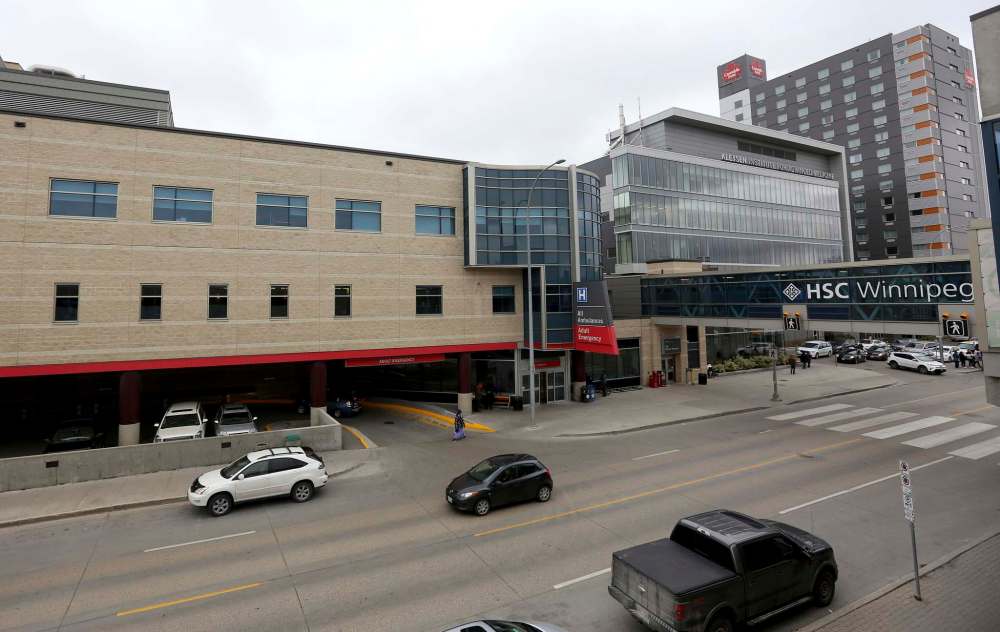HSC implements new security measures in response to recent violence
Advertisement
Read this article for free:
or
Already have an account? Log in here »
To continue reading, please subscribe:
Monthly Digital Subscription
$0 for the first 4 weeks*
- Enjoy unlimited reading on winnipegfreepress.com
- Read the E-Edition, our digital replica newspaper
- Access News Break, our award-winning app
- Play interactive puzzles
*No charge for 4 weeks then price increases to the regular rate of $19.00 plus GST every four weeks. Offer available to new and qualified returning subscribers only. Cancel any time.
Monthly Digital Subscription
$4.75/week*
- Enjoy unlimited reading on winnipegfreepress.com
- Read the E-Edition, our digital replica newspaper
- Access News Break, our award-winning app
- Play interactive puzzles
*Billed as $19 plus GST every four weeks. Cancel any time.
To continue reading, please subscribe:
Add Free Press access to your Brandon Sun subscription for only an additional
$1 for the first 4 weeks*
*Your next subscription payment will increase by $1.00 and you will be charged $16.99 plus GST for four weeks. After four weeks, your payment will increase to $23.99 plus GST every four weeks.
Read unlimited articles for free today:
or
Already have an account? Log in here »
Hey there, time traveller!
This article was published 30/10/2018 (2599 days ago), so information in it may no longer be current.
Manitoba’s largest hospital is restricting visiting hours and tightening overnight security measures due to a recent spike in violent incidents, many of which are meth-related.
Starting Wednesday, Health Sciences Centre will lock some adult patient units — medicine, surgery, rehab and addictions — beginning at 8:30 p.m. The hospital’s exterior doors — other than the ER departments — are already locked at that time.
The aim is to limit after-hours visits, except for designated family support members. Each patient can designate one or two such loved ones, who don’t necessarily have to be family.

Patients in palliative and end-of-life units, as well as those experiencing critical changes in their well-being, can have visitors at any hour.
Hospital staff and security officers will screen any visitors stopping by after 8:30 p.m. Adult and children’s emergency departments will be accessible at all times.
Ronan Segrave, HSC’s interim chief operating officer, said the visiting-hours change is being done on a trial basis until the end of November and is something the hospital has been considering for months.
“We’re trying to strike the appropriate balance between… family presence and one to two family visitors gaining access, but also this is about staff and patient safety and security. A message I have heard from staff within these units is they were concerned and actually I believe they will welcome this change,” he said.
Segrave acknowledged an increasing number of violent incidents at HSC of late, including an assault that made headlines earlier this month due to leaked security video footage.
In the video, a man who was believed to be high on meth repeatedly hit a nurse before being swarmed by multiple security guards, who traded punches with the man and tackled him to the ground.
The Free Press previously reported the number of RL6 forms — which hospital staff use to report violent encounters — nearly doubled already this year, from 41 in 2017 to 81 as of Oct. 10, 2018.
Segrave believes the surge in violence is a result of many issues, including an increase in crystal meth consumption, which can cause users to act erratically.
“I think there are a number of causes. I mean, clearly we’re responding — as is the entire health system and indeed society — to the situation in relation to crystal meth,” he said.
“Clearly that issue has impacts in relations to safety and security, just because of the nature of the impact the drug has on patients and also just (an) increase in volume of patients who are presenting with conditions that are associated with their addiction to crystal meth.”
HSC regularly tracks the number of patients presenting with narcotic or substance misuse problems, but more recently began recording meth-specific instances, Segrave noted. He hopes that data will become more useful after a few months of collection.
The hospital also enhanced a few other security measures recently, adding an extra officer on the floor of its emergency department, making a total of four, and increasing mobile security patrols on its more than four-million-square-foot campus.
HSC and the Winnipeg Regional Health Authority (WRHA) implemented a training program to help health-care staff in violence prevention, as well.
“The safety of patients, staff, visitors and everyone at HSC and in all our care facilities is of paramount importance,” Réal Cloutier, president and chief executive officer of the WRHA, said in a prepared statement.
“We continue to work as a health-care system with government and partners in the community to enhance and improve security across our facilities. We appreciate the public’s support and co-operation in creating safe, secure spaces for everyone.”
jessica.botelho@freepress.mb.ca
Twitter: @_jessbu
History
Updated on Tuesday, October 30, 2018 7:14 PM CDT: Adds factbox


